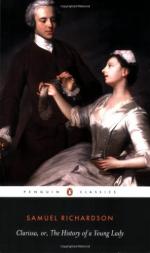Sir, you know best what you have done: you own the lady is the most injured, as well as the most deserving of her sex.
I do, Sir; and yet I would be glad to know what you have heard: for on that, perhaps, depends my answer to the questions Miss Howe puts to me by you.
Why then, Sir, since you ask it, you cannot be displeased if I answer you:—in the first place, Sir, you will acknowledge, I suppose, that you promised Miss Harlowe marriage, and all that?
Well, Sir, and I suppose what you have to charge me with is, that I was desirous to have all that, without marriage?
Cot-so, Sir, I know you are deemed to be a man of wit: but may I not ask if these things sit not too light upon you?
When a thing is done, and cannot be helped, ’tis right to make the best of it. I wish the lady would think so too.
I think, Sir, ladies should not be deceived. I think a promise to a lady should be as binding as to any other person, at the least.
I believe you think so, Mr. Hickman: and I believe you are a very honest, good sort of a man.
I would always keep my word, Sir, whether to man or woman.
You say well. And far be it from me to persuade you to do otherwise. But what have you farther heard?
(Thou wilt think, Jack, I must be very desirous to know in what light my elected spouse had represented things to Miss Howe; and how far Miss Howe had communicated them to Mr. Hickman.)
Sir, this is no part of my present business.
But, Mr. Hickman, ’tis part of mine. I hope you would not expect that I should answer your questions, at the same time that you refused to answer mine. What, pray, have you farther heard?
Why then, Sir, if I must say, I am told, that Miss Harlowe was carried to a very bad house.
Why, indeed, the people did not prove so good as they should be.—What farther have you heard?
I have heard, Sir, that the lady had strange advantages taken of her, very unfair ones: but what I cannot say.
And cannot you say? Cannot you guess?—Then I’ll tell you, Sir. Perhaps some liberty was taken with her when she was asleep. Do you think no lady ever was taken at such an advantage?—You know, Mr. Hickman, that ladies are very shy of trusting themselves with the modestest of our sex, when they are disposed to sleep; and why so, if they did not expect that advantages would be taken of them at such times?
But, Sir, had not the lady something given her to make her sleep?
Ay, Mr. Hickman, that’s the question: I want to know if the lady says she had?
I have not seen all she has written; but, by what I have heard, it is a very black affair—Excuse me, Sir.
I do excuse you, Mr. Hickman: but, supposing it were so, do you think a lady was never imposed upon by wine, or so?—Do you not think the most cautious woman in the world might not be cheated by a stronger liquor for a smaller, when she was thirsty, after a fatigue in this very warm weather? And do you think, if she was thus thrown into a profound sleep, that she is the only lady that was ever taken at such an advantage?




